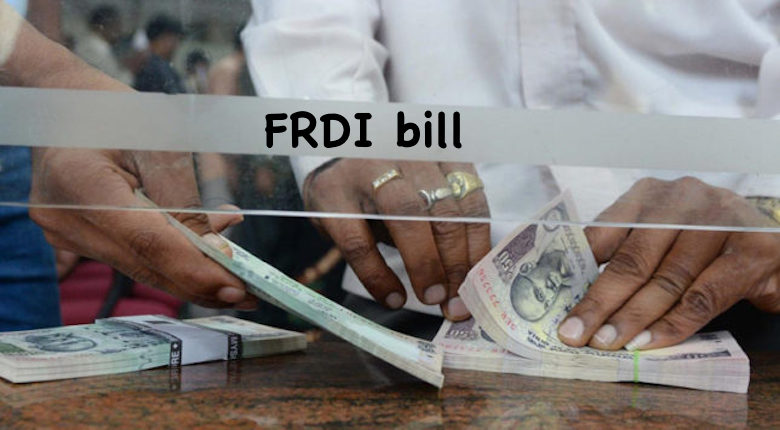FRDI bill : So much has been written and so much is being propagated against and in favor of the Financial Resolution and Deposit Insurance Bill 2017 in the media. While we put the speculations aside, to know how it’s going to impact the common man’s money saved in various banks in the country. Here in this post, we discuss the important implications of this bill on the individuals.
Quick Links
What is Financial Resolution and Deposit Insurance Bill 2017 (FRDI)?
FRDI is the first legislation of its sort in India. This bill is a part of Modi government’s aggressive approach to reform the Indian economy that aims at setting up a resolution corporation that will monitor banks, insurance companies and financial sector entities and categorize them as per their risk profiles and step in to prevent them from going bankrupts by writing down their liabilities. This will work together with Insolvency and Bankruptcy Code in dealing the bankruptcies of the firms in financial sector.
Why is it necessary?
Post financial crisis in 2008, need for a stronger banking and financial institutions has become inevitable to safeguard the savings of the individuals by having more government control. The high profile bankruptcies have shaken the faith of many investors and so are the people who saved their money in an ailing bank/ financial institution. With the drives such as demonetization and integration of every possible citizen with banking through Jan Dhan Yojana has also come the need for a comprehensive framework that facilitates the government to protect the savings of the people. In his 2016-17 budget speech, Finance Minister himself has acknowledged that there is a vacuum in the system dealing with bankruptcy situations in financial firms and reiterated the need for a bill like FRDI.
What are the important provisions in the bill?
Resolution Corporation:
Existing Deposit Insurance and Credit Guarantee Corporation will be replaced by constituting a resolution corporation that will perform various functions such as monitoring the financial entities, taking corrective measures to save the ailing firms. The Corporation will have a Chairperson and its members will include representatives from the Finance Ministry, RBI, and SEBI, among others
Classification of financial firms:
The corporation classifies the firms as low, moderate, material, imminent, or critical based on their risk of failure and monitor accordingly. Also, it provides deposit insurance to the banks and financial firms as laid down in the bill.
Repeals DICG act:
FRDI repeals the Deposit Insurance and Credit Guarantee Corporation Act, 1962 and amends 12 other laws.
- Apprehensions:
- ‘Bail in’ clause:
This clause empowers the resolution corporation to use public money in case the bank starts falling. This would typically be done either by cancelling the bank’s liabilities, or converting them into other forms. This is the main concern that is making rounds in social media that the people saving money in banks will suffer if this bill becomes an act. In the year 2013, bank of Cyprus was bailed in using customers money where half of their money has lost which was uninsured
- Also, the bill empowers the resolution corporation to decide the amount of deposit insurance for each depositor. Under the existing law Deposit Insurance and Credit Guarantee Corporation provides deposit insurance of up to Rs 1 lakh in the event of bank failure. But under FRDI the resolution corporation gets the authority to even cancel the Rs 1 lakh insurance that depositors get under the current law provided by Deposit Insurance and Credit Guarantee Corporation and a bank can even declare that they don’t owe them any money at all. The amount of insurance that will be made available under FRDI has not yet been specified in the bill.
- FRDI seeks to amend the SBI act in order to insert a clause about its liquidation which gives more signs that the government may even resort to privatize the SBI in the event of financial exigency.
- FRDI bill will also weaken the RBI by granting the overriding powers to the resolution corporation. It will also empower the ailing banks to manage the savings of their customers in a way that would deprive the customers of their rights in verge of bankruptcy.
Bottom line:
Though the bill may seem to be usurping the powers of RBI and the rights of common man, the fact is that the risk is no more or no less than it ever was. However, it is clear that this bill poses a serious threat to the hard earned money of the public and a test to the tolerance level of general public in accepting the current government’s aggressive policies soon after demonetization.
But the government has clarified saying that FRDI is more depositors centric than the banks and financial firms. Finance minister has said that FRDI Bill goes beyond the current provisions to provide greater protection to depositors. He has also reiterated the same by saying that “the objective of the Government is to fully protect the interest of the financial institutions and the depositors. The Government stands committed to this objective”
The finance ministry official has said “Equity will absorb losses first and then subordinated debt will be bailed-in. The other liabilities including deposits maybe bailed in only after this,” thus the depositors money is as safe as it is today. Also the permission of NCLT will decide the amount of compensation to depositors in the case of bail-in.
Recommended Articles







